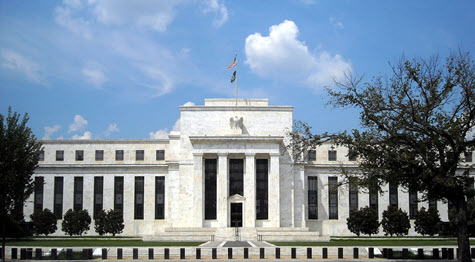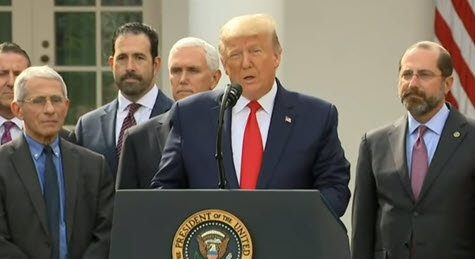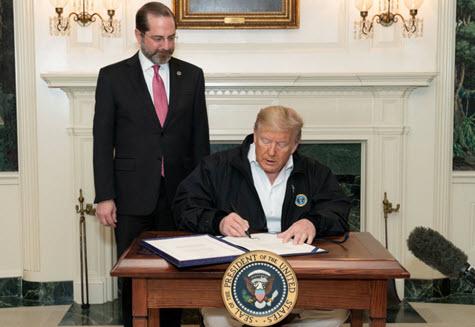Small Business Emergency Loans Under the “Paycheck Protection Program”
 Federal Reserve 13(3) Lending Programs and Facilities in the CARES Act
Federal Reserve 13(3) Lending Programs and Facilities in the CARES Act


The Federal Reserve and central banks around the world conducted urgent large-scale interventions in capital markets this week to ease strains on economies and investors as the economic toll of the coronavirus expanded dramatically in the U.S.
Hotels and Malls Hit By Coronavirus Economic Shocks
The economic shockwaves of the coronavirus pandemic are quickly affecting operations of major U.S. hotel chains and other aspects of the commercial real estate industry.
The Roundtable is in contact with its membership to assess the widespread repercussions of the crisis and will report its findings to policymakers to help formulate targeted policies to combat the pandemic.
# # #

Senate Majority Leader Mitch McConnell (R-KY) unveiled a “Phase III” coronavirus economic stimulus proposal on March 19 that includes a number of tax provisions important to real estate – including a temporary reinstatement of the net operating loss carryback; relaxation of the current-law restrictions business interest deductions; and long-sought technical corrections to several provisions in the 2017 tax code overhaul (e.g. qualified improvement property).
The Coronavirus Aid, Relief, and Economic Security (CARES) Act will be subject to change or additions as Democratic lawmakers and the White House with Republicans engage in urgent negotiations to produce a final bill by early next week. A number of tax provisions in the current package affecting real estate include:
Other noteworthy tax provisions in the bill:
The full text of the CARES Act is available here and a lengthier summary is available here. Additional Reference: Deloitte’s Tax News & Views March 20 summary.
Cancellation of Indebtedness (COD) Income
The Real Estate Roundtable today asked Treasury Secretary Mnuchin and IRS Commissioner Charles Rettig to act quickly and use their broad authority to provide additional emergency tax relief that will help discourage permanent business closures, layoffs, and consumer bankruptcies.
Specifically, The Roundtable urges the Administration to waive cancellation of indebtedness (COD) income for all taxpayers for events generating COD income between March 1 and August 31, 2020. (Roundtable COD letter, March 20)
As the repercussions of the corona pandemic continue to unfold, The Roundtable’s Tax Policy Advisory Committee (TPAC) continues to work on tax policies that benefit American workers, businesses and the overall economy.

Policymakers raced this week to complete a massive economic response to stem the spiraling public health and economic toll of the Coronavirus pandemic. As infection and death rates continued to grow, jobless claims soared, hotels and malls temporarily closed world-wide, and President Trump invoked rarely used emergency powers to fight what he called a “medical war.” (NYTimes and BBC, March 19)
Phase 1, enacted on March 6, is a $8.3 billion packaged focused on public health measures to bolster vaccine development and research, increased equipment stockpiles, and support for state and local health responses to the virus. (Roundtable Weekly, March 6).
Phase 2, signed into law by President Trump on March 18, is the $104 billion Families First Coronavirus Response Act (H.R. 6201), which includes paid leave provisions for employees, free COVID-19 testing, expansion of unemployment insurance, food assistance, and other provisions aimed at immediate relief for affected individuals. (Joint Committee on Taxation, March 16)
Phase 3, a $1 trillion-plus bill introduced yesterday by Senate Majority Leader Mitch McConnell (R-KY), will focus on (1) general economic stimulus, (2) small business and individual relief, (3) airline and travel industry concerns; and (4) health care matters.
The Roundtable Urges Focused Policy Actions
The Real Estate Roundtable, along with 113 other organizations, wrote to the Administration and congressional leadership on March 18 to urge swift and unprecedented action to confront the fallout from COVID-19.
As policymakers intense efforts to mitigate the effects of the pandemic, The Roundtable will continue to communicate unified industry policy recommendations in the short-term crisis or addressing longer-term stimulus of the U.S. economy, infrastructure investment, workforce development and efforts to stabilize capital markets.
# # #


President Trump declared a national emergency this afternoon to unleash billions of disaster reserve funds to combat the coronavirus, as House Speaker Nancy Pelosi (D-CA) announced this evening that she “clinched a deal” with Treasury Secretary Steven Mnuchin on legislation to assist families and businesses immediately impacted by the pandemic. (POLITICO, March 13)
Emergency Declaration
Congressional Action
In the coming weeks, further policies from Congress and the Administration are expected to address longer-term stimulus of the U.S. economy through measures such as infrastructure investment, workforce development, increased lending for small businesses, and stabilizing the capital markets. The Roundtable will continue to work with our colleague partner associations to unify the real estate industry’s message as policy makers develop and implement measures to mitigate the COVID-19 pandemic.
# # #

Central banks around the world took dramatic action this week to mitigate the economic fallout of the coronavirus pandemic.
European Central Bank and Individual Nations Respond
After the US Federal Reserve and Bank of England announced aggressive rate cuts in recent days to stimulate their respective economies, the European Central Bank (ECB) left its key interest rate unchanged at minus 0.5%.
On March 5, Federal Reserve Bank of New York President John C. Williams confirmed that the international community of central bankers are working together to stem the economic shock of the coronavirus. “… policy actions by central banks are clear indications of the close alignment at the international level,” Mr. Williams said. (NYTimes, March 5)
# # #


This week congressional policymakers overwhelmingly passed, and President Trump signed, an $8.3 billion emergency spending package to combat the coronavirus outbreak in the U.S. – after the Fed reduced interest rates by a half-point amid early signs of economic disruption.
The potential impact of coronavirus on the health of global markets and the U.S. economy; commercial real estate sectors and the industry’s response; and how it may affect the routines of millions in American society, will be a focus during The Roundtable’s March 31 Spring Meeting in Washington, DC.
# # #

Deepening concerns over the international spread of the coronavirus (COVID-19) have prompted U.S. policymakers to consider measures for combating the potential public health and economic repercussions of the global disease, as the commercial real estate industry braces for potential disruption.
Dramatic drops in international stock markets this week reflected investor anxiety over the potential global economic impact of a virus that has, so far, infected more than 83,000 people in at least 56 countries and killed more than 2,800 – with no vaccine yet in sight. (New York Times and Axios for coronavirus daily updates)
Today, the World Health Organization raised its risk level of the global coronavirus to “very high” – the most serious assessment in its four-stage alert system. “This is a reality check for every government on the planet. Wake up. Get ready. This virus may be on its way,” said Dr. Michael J. Ryan, deputy director of W.H.O.’s health emergency program. (The Hill, Feb. 28)
Dr. Nancy Messonnier – director of the National Center for Immunization and Respiratory Diseases of the Centers for Disease Control and Prevention (CDC) – on Feb. 25 told reporters, “We really want to prepare the American public for the possibility that their lives will be disrupted.” She added, “Ultimately we expect we will see community spread in the United States. It’s not a question of if this will happen, but when this will happen, and how many people in this country will have severe illnesses.” (CDC Coronavirus Resources)
There are now 62 confirmed cases of novel coronavirus in the United States, Messonnier stated during a press briefing today. The limited guidance that has been distributed to date has primarily been directed at health care professionals, not specific industries.
Trump administration health officials on Tuesday told Senators during a closed-door briefing that a vaccine, although being rushed into clinical trials, could take more than a year before one would be widely available to the public. (Washington Post, Feb. 25)
The Trump Administration initially requested $2.5 billion to combat the spread of the virus. Congressional appropriators are working this weekend on an emergency coronavirus spending package of $6 billion to $8 billion and intend to take action on the House floor next week. House Speaker Nancy Pelosi said bipartisan discussions on a final figure are getting “close.” (PolticoPro, Feb. 28)
Federal Reserve Board Chairman Jay Powell issued a statement today to ease investor concerns. “The fundamentals of the U.S. economy remain strong. However, the coronavirus poses evolving risks to economic activity. The Federal Reserve is closely monitoring developments and their implications for the economic outlook. We will use our tools and act as appropriate to support the economy,” Powell stated. (The Fed, Feb. 28)
Just earlier in the week, Fed officials said it was too soon to ascertain the potential adverse effect of the coronavirus on the U.S. economy. Fed regional presidents said they are carefully monitoring the progression of the virus and how disruptions in global supply chains may affect the U.S. before considering a decrease in interest-rates. (Wall Street Journal, Feb. 25)
As stocks are on track for the biggest weekly losses since the 2008 financial crisis, investors have reassessed the chances that the Federal Reserve will lower interest rates to as soon as March (Wall Street Journal, Feb. 27)
CRE Industry Concerns
Roundtable President and CEO Jeffrey DeBoer said, “Owners and managers of all types of buildings are taking actions to better understand the potential contagion and how to best help building occupants, visitors and employees prevent further spread of the coronavirus. This viral threat to lives, businesses and economies is a top concern for our industry and we stand ready to assist public health officials as they recommend.”
The Roundtable’s Homeland Security Task Force (HSTF) and the Real Estate Information Sharing and Analysis Center (RE-ISAC) are in close contact with the Department of Health and Human Services (HHS) and the Centers for Disease Control and Prevention (CDC) to provide useful information to the real estate industry on the coronavirus threat as it continues to evolve.
The Roundtable’s HSTF & the RE-ISAC will also host a conference call on Monday, March 2 with CDC’s Deputy Director for Infectious Diseases, Dr. Jay Butler.
Coronavirus-related updates and resources are available to the commercial real estate industry through the RE-ISAC’s #COVID Section, which includes these recent reports:
Other resources include:
The Roundtable’s next membership meeting is currently scheduled for March 31 in Washington, DC (Roundtable-level members only).